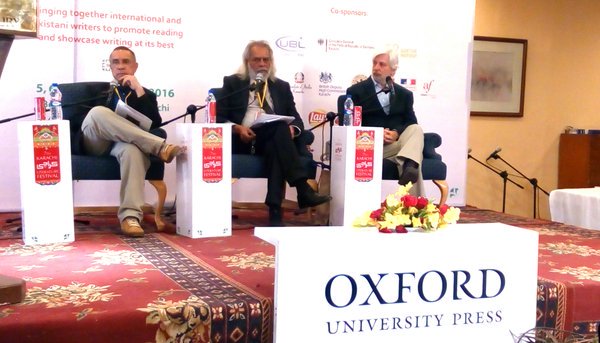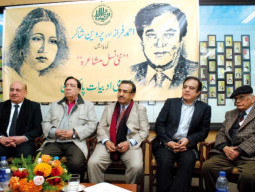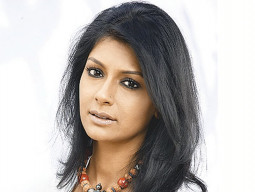
Speakers were invited to investigate the commonly-held notion that our national poet’s magnum opus, Javednama, was inspired by Italian poet Dante Alighieri’s Divine Comedy.
Poet and scholar Afzal Ahmed Syed was present on stage at the Beach Luxury hotel of Karachi, flanked by intellectual historian Dr Nomanul Haq and Italian writer Andrea Berrini.
The discussion began only after Syed was done reading out the full introduction of the speakers.
Looking for science at a literature festival
Berrini’s was more of an earnest rehashing of Wikipedia information about Divine Comedy and one wonders who coerced the Metropoli d’Asia founder to speak on something that seemed to be at a tangent to his area of expertise.
His Italian descent was perhaps the only real form of relevance that he had with the session.
It was also revealed that Berrini was supposed to read from Divine Comedy’s original text, but no Wi-Fi meant a change of plans.
Syed had little or none to bring to the table and when he did jokingly recite one half-verse from the Javednama, Deen-e-mullah fi-sabeel illah fasaad (The mullah’s religion is corruptness in the way of God), he did so with a pronunciation error; Mullah bashing at a discussion of Dante, Iqbal and the Arabo-Islamic tradition helped little but degenerate an otherwise engaging moot.
Given the restlessness of the attendees over the lack of substance in the talking, when his turn came, Haq was compelled to take to the podium.
His was a masterclass of the topic, as he expressed reservations over the speculation that Iqbal derived from Dante.
“The post-colonials have suffered a rupture from history hence our narrative is a constructed one,” the Institute of Business Administration, Karachi, professor stated.
Citing the research of scholars such as Maria Corti and Gregory Stone, he said that it is highly unlikely that Iqbal drew from Dante. “Instead they both drew from a common source, the Arabo-Islamic tradition,” Haq maintained.
“Corti in Dante Studies says Dante was drawing upon the tradition. She links the Divine Comedy to Kitab al-Miraj,which was readily available in Latin, Spanish and old French.”
Haq cited Ibn Arabi’s Kitab al-Isra (The Book of Nocturnal Journey), Al-Maarri’s Risalat al-Ghufran (The Epistle of Forgiveness) and works of Ibn Rushd and Ibn Tufail as the influences of Dante.
“Arabi had a kind of epiphany in 1200 CE to embark on a journey. This is replicated in the Divine Comedy ... the night before Good Friday in 1300 CE when he [Dante] goes out,” he said, adding, “And Arabi is known in the Latin tradition.”
He then moved to identifying the aforementioned scholars with Iqbal. “Iqbal, my murshid, is fully drenched in the Arabo-Islamic tadition.
This is a commonality of sources not direct borrowing.”
In the examples that he quoted from Iqbalian depictions of Ibn Arabi’s ideas, he cited the dialogue between God and Iblees in Zarb-e-Kaleem.
“Iblees tells God, ‘I did not prostrate myself before Adam because you did not will it since whatever you will, happens. I was framed!’ God asked him when did you find out, before refusing or after refusing?’
To which he replied, ‘My Lord after refusing!’ God said, ‘There you are’,” Haq narrated.
He said this is a fine explanation of the question of predestination and free will. “If I want to jump off this stage, I can. In hindsight maybe I can say it was predestined but right now I have the ability to do that,” he added.
He then proceeded to talk about Iqbal’s piece on Maarri, Kehte hain kabhi gosht na khaata tha Maarri (It is said that Maarri never ate meat).
The professor said that there’s an enormous body of literature in Arabic but we don’t want to read it. “Someone was saying here [at the festival] that we didn’t learn anything from Arabic, instead we learnt from Persian. This is all propaganda,” he maintained.
Haq said the astronomical order is very Ptolemaic with Iqbal and very Christian in the case of Dante. “The whole scheme of Dante is very medieval. There’s the Christian world-view there and not here [in Iqbal].”
He said he feels terribly happy that the greatest Italian writer was connected to the tradition to which his own ancestors belonged. Taking from Rumi, he said, “It is a case of wasl (union) and not fasl (divide).”
Other than Haq, the speakers refused to portray their competency to speak on the Iqbal-Dante question and therefore the Q&A segment was largely diverted towards the professor only.
“The KSBL dean once asked me, ‘Dr sahib, you know Arabic? You look quite liberal (though)!’,” he recalled, adding, “Arabic is a joke in Pakistan.
KLF remembers the father of literature festivals
"We have to delink languages from religiosity. The urgency should be felt.”
Quoting a thorny statement of Nobel laureate VS Naipaul, Haq said, “Muslims are condemned to use the mobile phone but never to make it.” He said when the connection with languages and classics is lost, “all that is left is bookkeeping”.
In response to a question, he also addressed the speculation that Iqbal wrote Jawab-e-Shikwa over pressure from mullahs.
“There is absolutely no evidence for this. And this is not my conclusion. This is the position of Shamsur Rehman Faruqi, the biggest scholar and critic of Urdu,” Haq said.




























1713853507-0/MalalaHilary-(2)1713853507-0-270x192.webp)








COMMENTS
Comments are moderated and generally will be posted if they are on-topic and not abusive.
For more information, please see our Comments FAQ